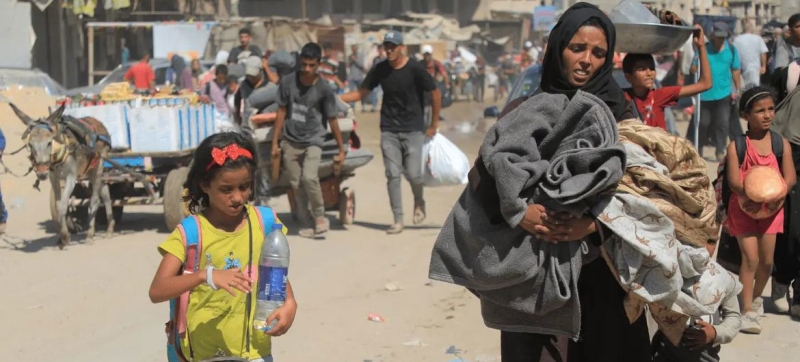- Israel Strikes Tehran with US Support Amid Nuclear Tensions |
- India Sees 9% Drop in Foreign Tourists as Bangladesh Visits Plunge |
- Dhaka Urges Restraint in Pakistan-Afghan War |
- Guterres Urges Action on Safe Migration Pact |
- OpenAI Raises $110B in Amazon-Led Funding |
Aid Trucks Stalled in Gaza as Israel Delays Green Light

A displaced family leaves the eastern area of Deir Albalah after Israeli authorities issued an evacuation order for the area.
Despite a brief easing of Israel’s 11-week blockade on Gaza, five trucks carrying lifesaving humanitarian aid remain stranded inside the enclave, awaiting final clearance to distribute supplies, UN officials said on Wednesday.
Displaced families continued to flee areas under fresh evacuation orders, such as the eastern part of Deir al-Balah, while aid agencies warned of a deepening humanitarian catastrophe due to restricted access to essential goods.
“Humanitarian assistance is being weaponised to serve political and military objectives,” said Philippe Lazzarini, Commissioner-General of the UN agency for Palestinian refugees (UNRWA), speaking at the European Humanitarian Forum. He stressed that large quantities of aid remain blocked at border crossings.
UNICEF reported that its nutrition stocks in Gaza are nearly exhausted, leaving thousands of children at heightened risk of malnutrition. "UNRWA is a lifeline for people facing immense needs," Lazzarini added, noting the community’s readiness to deliver aid if access is granted.
While Israeli authorities allowed the entry of around 100 additional aid trucks on Tuesday through the Kerem Shalom crossing, most of these remain immobilised, awaiting further authorisation to proceed into Gaza. This is a far cry from the 500 aid trucks that entered Gaza daily before the war erupted in October 2023.
Today, one in five Gazans faces starvation, according to the UN-backed Integrated Food Security Phase Classification (IPC). Meanwhile, over 130,000 tonnes of food remain stuck at Gaza’s borders.
The World Food Programme (WFP) warned that conditions on the ground are “horrific” and threatening the lives of more than two million people. “Even 100 trucks a day would only meet the very minimum food needs,” said Antoine Renard, WFP Country Director for Palestine. He added that without immediate and safe access, insecurity and looting would increase. “A single bag of wheat flour now costs $500 in Gaza,” he said.
WFP also reported that Gaza’s food supply chains have collapsed, markets are paralysed, and prices have skyrocketed. Many staple items—such as eggs, frozen meat, and wheat flour—are no longer available. The price of flour alone has risen by over 3,000 per cent compared to pre-war levels and over 4,000 per cent since the January-March ceasefire.
Gaza’s economy is now in near-total collapse, while the occupied West Bank is also facing a steep downturn. Combined output in the Occupied Palestinian Territory has shrunk by 27 per cent, marking the worst economic contraction in over a generation. WFP estimates Gaza will need 13 years to return to pre-crisis levels, while the West Bank may require three years.
Meanwhile, in the West Bank, Israel continued demolition activities in Beit Sahur, Shu'fat, and Nahhalin earlier this week. The UN Office for the Coordination of Humanitarian Affairs (OCHA) reported over 60 incidents this year where Israeli settlers damaged water infrastructure, severely impacting herding communities.

